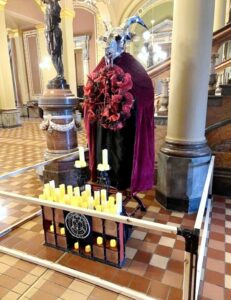
In the early 700s, a missionary monk proselytizing Pagan tribes in modern day Germany came to a town in the modern-day region of Hesse. Many of the barbarian locals were receptive to the Christian message, turning away from their worship of Pagan gods. However, some were hesitant to convert and still others, while converting publicly, continued to make sacrifices to elements of nature, like trees and springs. One tree in particular was a stumbling block for these Hessians, a mighty oak tree known as the “Oak of Jupiter.”
So one day, with the support of the local full-throated converts, this missionary – known to us as St. Boniface – took an axe to the base of the mighty oak. The pagans waited for Boniface to feel the unbridled fury of their gods in response to this affront. However, rather than seeing Boniface struck down, quite the opposite happened, at least according to the ancient account of the 8th century bishop Willibald:
“But when the fore side of the tree was notched only a little, suddenly the oak’s vast bulk, driven by a blast from above, crashed to the ground, shivering its crown of branches as it fell; and, as if by the gracious compensation of the Most High, it was also burst into four parts, and four trunks of huge size, equal in length, were seen, unwrought by the brethren who stood by. At this sight the pagans who before had cursed now, on the contrary, believed, and blessed the Lord, and put away their former reviling.”
The story goes that Boniface then used the wood from the Oak of Jupiter to build a chapel dedicated to St. Peter. Further legend has it that behind the mighty oak was a fir tree, which became the origin of the tradition of Christmas trees.
I suspect a little embellishment may have been added to Boniface’ legend, but what’s more interesting to me is that at the time that it was written, this story was regarded as an act of heroism by the Christian saint. Like the well-known legend of St. Patrick driving the serpents (which are likely a metaphor for druidic paganism) from Ireland, the Christian lack of tolerance for false religion was, once upon a time, celebrated. This spirit is bolstered by the fact that Boniface’ story so closely parallels the story of Gideon tearing down the altar to Baal and the Asherah in Judges 6.
One wonders how we’ve come, in the last 1300 years, from celebrating the courage of Boniface to celebrating a “pluralistic” society, as best exemplified by the Rev. Jon Dunwell, a representative in the Iowa House.
 Early this week, Dunwell drew attention to the fact that the Iowa state capitol is currently displaying a Satanic shrine. This is not hyperbole. The Satanic Temple of Iowa, as a recognized religious organization, has been allowed to erect a goat-headed figure in a velvet cloak surrounded by creepy candles and emblazoned with a pentagram in the capitol building.
Early this week, Dunwell drew attention to the fact that the Iowa state capitol is currently displaying a Satanic shrine. This is not hyperbole. The Satanic Temple of Iowa, as a recognized religious organization, has been allowed to erect a goat-headed figure in a velvet cloak surrounded by creepy candles and emblazoned with a pentagram in the capitol building.
Dunwell makes it clear that he dislikes this new décor, but that, as our battle is not against flesh and blood, “we tear down the places of idolatry in our hearts. We are not called to physically tear down false places of worship.”
And that’s mighty neighborly of him.
I guess the spirit of St. Boniface is a thing of the past – at least among Christians. While those in Rep. Rev. Dunwell’s line of thinking are enjoying their pluralism, Christians in cities around the country have seen the symbols of their most sacred beliefs uprooted. Just in Michigan in the past few years, several cities have been forced to remove crosses that represented the beliefs of the majority of their community – Frankenmuth and Grand Haven. Just for fun some time, type into Google “City Removes Cross;” there are dozens of examples from around the country. Those of you with long memories will also recall the court-ordered removal of statues of the Ten Commandments from several courthouses in the nation. There is court case after court case to pour over of atheist groups trying to remove Christian symbolism from the public arena.
It’s not so widespread in the US, although there are recent examples, but along with being “pluralistic” we’re also being herded into a globalist society, so the spate of vandalizing public Christmas trees in Europe is also relevant.
“Pluralism” for Christians, at this point, is just handing over your lunch money so the bullies won’t hit you.
Now, I’m not writing this from a flight to Des Moine, axe in hand. The display is temporary, and I wouldn’t recommend anyone else buying a one-way ticket either. But between a modern-day Boniface and Jon Dunwell, well, I’d rather high-five the Boniface. Acting as if there’s mutual respect all around is not an example of being “wise as serpents and innocent as doves.” (Matt 10:16)
One wonders how the Dunwell view of Boniface and his treatment of the Oak of Jupiter would differ from the way the website Hindu Human Rights recounts it, “The criminal responsible was St. Boniface, an Anglo-Saxon churchman who spread the new totalitarian doctrine of Christianity throughout Germany.”
This Christmas, as we reflect on the coming of the son of God, not just as a cute baby in a manger, but as a sacrifice come to suffer and die in our place, maybe we could use a little more of that Boniface spirit. Maybe we could use a little more of the attitude that says, “Christ died for this place, and we won’t stand for devil worship here.”
I don’t know if Christmas trees originated with the story of Boniface or not, but the illustration is true. The worship of idols, pagan or secular, will collapse and be replaced by the worship of Christ, whether now or in the future.
Maybe a Boniface is just what we need.
To view this article in your browser, Click Here
For more information, articles and newsletters, please check out our website at https://americandecency.org/
You can support ADA financially by visiting: https://give.cornerstone.cc/americandecency

Call us:
231-924-4050Email us:
info@americandecency.orgWrite us:
American Decency AssociationCopyright 2024 American Decency